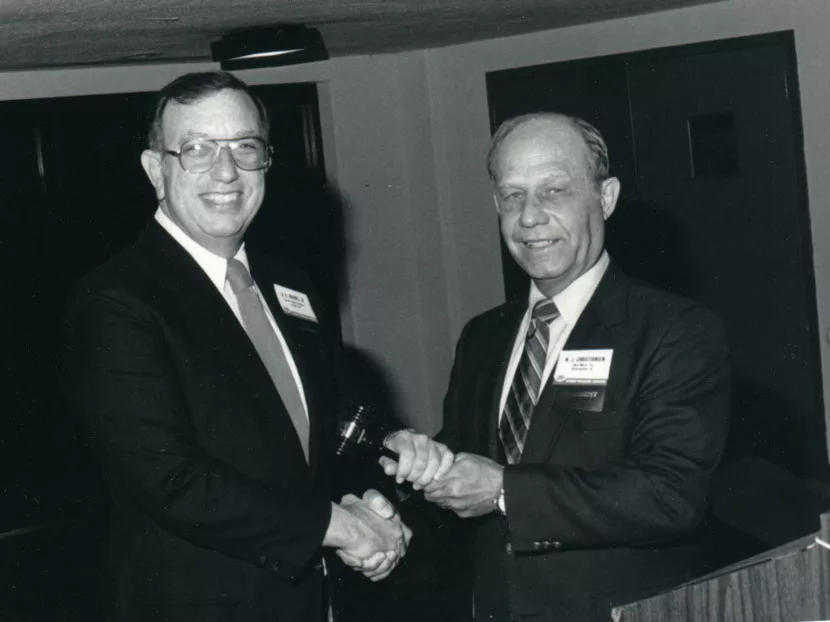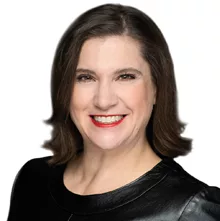Step back in time to 1928 – many things we take for granted today made their debut that year: Mickey Mouse appears in his first short film “Steamboat Willie”; Pedro Flores, a Filipino immigrant to the United States, opened the Yo-Yo Manufacturing Co. in Santa Barbara, California. Not to be left out, Shirley Temple (and my father) were born, and Alexander Fleming discovered penicillin. All life-changing events that in some way shaped our world today.
Something else happened that year that had a major impact. On December 7, 1928, the first meeting of the Southern Wholesalers Association was held in Atlanta, comprised of thirty-two men from seven southern states. Serving as temporary Chairman at that meeting was Lloyd U. “Casey” Noland, founder of Noland Co. The group met to discuss the feasibility of establishing a trade association to promote the interests of the industry and members through discussions and exchange of information relating to the problems of business. The men adopted the name Southern Wholesalers Association (SWA) and elected the first slate of officers. Today, SWA is the largest of the regional associations affiliated with American Supply Association, and SWA’s membership includes more than 950 locations throughout the southern states of: Alabama, Arkansas, Mississippi, Florida, Georgia, Louisiana, North Carolina, South Carolina, Kentucky, Tennessee, Virginia and Bahamas/Caribbean Islands.
At the helm of SWA is Terry Shafer, executive vice president, who by all accounts is a southern gentleman. With style, charm and the gift of storytelling, Shafer leads a vibrant and dynamic association, which has grown immensely since his arrival 14 years ago.
Growing up in the West Texas farming community of Muleshoe, Texas, Shafer learned what it means to work hard and be a part of a community that relies on each other. As a four-sport athlete in high school and college football player, he developed a real understanding of teamwork, self-discipline, and sacrifice to achieve goals and dreams. Shafer holds a master’s degree in Counseling Psychology and has applied his ability to adapt to different environments and help people and companies achieve their goals.
I sat down with Terry to discuss the past, the present and where SWA is headed.
Ruth Mitchell (RM): When SWA was formed, the original mission – taken directly from the notes of the meeting, was to “be the mutual protection, improvement and harmonizing of business customs, usages and practices in the plumbing and heating supplies jobbing industry, securing the promotion cooperation and united effort in all matters relating to improvement of conditions in the industry; adjusting grievances and controversies between members of the Association and their customers, establishing and improving suitable coworking conditions, eliminating unfair and improper practices in the industry and in general, establishing closer ties to business association in said industry so that the welfare of all engaged in said industry may be conserved and promoted.”
What is the mission NOW for the Association?
Terry Shafer (TS): The beauty of SWA is the mission now is very similar to the mission when it was formed. SWA leads our industry by leveraging the strength of its membership to help other members.
RM: You have led SWA for just about 14 years now. What drew you to Association Management?
TS: Honestly, God’s sense of humor. A friend introduced me to Bill Kenny of Kenny Pipe and Supply, and the rest is history.
RM: What qualities does this organization have that drew you to it?
TS: I grew up in Muleshoe, Texas, and both my grandparents were farmers. We knew everyone in our community, and I learned early in life we need to rely on one another. When I was growing up, each morning one of my grandfathers would go to the Dinner Bell Café and have breakfast and talk with other farmers about crops, bugs, rain, fertilizer, etc.; they helped each other be successful. The businesses in the town supported the local farmers by selling them tractors, seed, feed for cattle, etc. SWA reminds me of my hometown, and the people in this industry working together to be successful is no different than what I learned as a kid. The impoverished West Texas farms would get damaged crops from hail, have droughts, etc. and yet they always pulled together to help each other. No difference with SWA. I even think the farmers were a little crazy out there as they had tiny margins just like this industry.
RM: What helped you learn the business?
TS: Before SWA, I was the general manager of a $63 million distribution company in the fiber optics fusion splicing industry. I understand distribution from the vendor to the customer, margins, sales relationships, pricing, etc., which gives me the foundation for understanding our members and vendors. I also worked in behavioral healthcare for many years, and understand people and how each personality type is motivated. Working with volunteer leadership requires focus, motivation and accountability. There are many moving parts to what we do, and, on any given day, we are working on something a month from now or three years from now. There is no way I could juggle all these tasks without the assistance of my amazing staff, especially Linda Wilbourn, who has worked for me for 12 years and Michele Fort who has been with me for three. They are exceptional at what I am not.
RM: When it comes down to it, the vitality of an association is its membership. What does membership look like today, and how has consolidation hit the region?
TS: We currently have 68 member companies, 92 manufacturer firms and 35 rep companies. Consolidation continues to be one of our most significant challenges. However, we continue to be a stronghold for family owned businesses and large corporations alike. Approximately 65 to 70 percent of our companies are second generation and beyond.
RM: Tell me about the membership benefits of networking, education, seminars and the training programs.
TS: SWA holds an annual convention, and last year topped out at 775 attendees: our Leadership Development Council has yearly tours of manufacturers and educational events; we provide an annual benchmarking survey to keep our members informed; and SWA hosts a yearly profit enhancement seminar, which consists of MBA level sales management and operational finance training. Our wholesaler and manufacturers’ representative members have dual membership with ASA, and we support the ASA University. We believe our members are stronger with close connection to a strong ASA.
RM: The annual convention has grown significantly over the years and has positioned itself as THE go-to industry event – and, as a family affair. When did the switch happen from strictly business to being family friendly?
TS: At the 2009 convention, I was speaking to a group of manufacturer representatives and noticed an individual standing behind them. It was one of the spouses who was not registered for the event, as the company didn’t pay for spouses to attend. I was troubled that she was excluded as we are a group that believes strongly in inclusion. I realized we needed to make a change and be more welcoming to families. I presented the issue to the Suppliers Advisory Council, which is comprised of key manufacturers and rep firms. They asked what the cost would be to include spouses and children; I gave them a number and they said, “why not increase our registration fee to have them attend for free?” The board loved the idea of “attend for free,” and the rest is history. Now we typically have 225 to 250 spouses and 200 kids in attendance. It is phenomenal how many of our manufacturers and their representatives know a wholesaler’s entire family and vise versa. Enhancing the depth and breadth of relationships among our members is spot on with our mission.
RM: What are the challenges members face that SWA helps address?
TS: Staying informed and getting information from experts and peers. Our members share information in best practices sessions – we all can learn from one another. As an association, we also understand the need to bring in experts on issues that affect our industry. When the no-lead legislation hit our industry, we were active in bringing in experts to address our membership and held a meeting regarding how everyone was responding to the legislation.
We look at the 50,000-foot view, as well as issues that impact our members every day in their workplace. This year’s convention keynote speaker is a former CEO of Southwest Airlines. If anyone knows about customer service, it would be Southwest Airlines. Also, a panel discussion will include a large developer and a manufacturer to talk about the challenges they face, and what they are looking for in the vendor and distributor relationships.
RM: What new initiatives have you rolled out while with SWA?
TS: We implemented a complete change of the convention by providing a balance of structure and leisure time for vendors and wholesalers to spend time together. Making the meeting a family affair is one of the most successful changes we accomplished. We also ramped up our member visits – it’s crucial to step into a business and see what is happening daily.
Another new initiative was the creation of the Leadership Development Council, which provides guidance, education, and networking for our up and coming leaders. The council also understands the importance of giving back, and, in 2015, celebrated the spirit of a great leader and created the Dottie Ramsey LDC Scholarship. The fund provides scholarships to graduating high school seniors or full-time college students who are dependent children of SWA members and associate members. We raised the first $50,000 in 2016 and awarded our firsts two scholarships in 2017. We have increased the amount and have three scholarships to award in 2018. The council continues to raise money, so we can add scholarships each year.
Lastly, we couldn’t do what we do without support from the vendor community. As our wholesaler distributor numbers grow, so does the relationship with manufacturers and rep firms. We have some great support from this group, as our sponsorship dollars have increased yearly since 2005, allowing us to expand out networking and educational opportunities.
RM: What’s on the horizon?
TS: SWA is generating leadership relationships between the next generation of industry leaders. Much like we have over the past 90 years, we have teenagers attend our convention today who in 15 – 20 years will run the family business. They will be working with the same people they have formed relationships with at our events. Whether an emerging leader works for a wholesaler, manufacturer or manufacturer rep firm, they all benefit from the relationships they are forming through SWA. Our members have a sense of identity and autonomy. There is a sense of pride in their association. They realize it is their association and no one else’s.
We also developed a Mechanical Products Council two years ago, and will offer more to our members who have mechanically focused products. Our members will determine the future of SWA. We have regular board meetings, Leadership Development Council meetings, Mechanical Products Council meetings and an annual Suppliers Advisory Council meeting where our members plot the course for the future. We have loyal and committed leaders who rally to make their industry stronger.
RM: How does the association cope when industry times/financial times are tough?
TS: Tough times hit everyone, and SWA does not believe in increasing dues when our members are struggling. If anything, that is when we need to be the most present, look for ways our wholesalers can work smarter and learn from others as they face the challenges. We all learned a great deal in 2008.
RM: I love a “you’re not going to believe this” story. Tell me one.
TS: Easy: we held a convention in Panama City, and a tropical storm was roaring through. Golfers are known to be of hearty stock, and the 44 golfers who had signed up to play 18 holes did just that - decided to play anyway, and it was a blast. Everyone was drenched but laughing and having a great time.
RM: What is the best piece of advice you have ever received that you use?
TS: “People will forget what you say, and people will forget what you do, but they will never forget how you made them feel,” from Maya Angelou.








